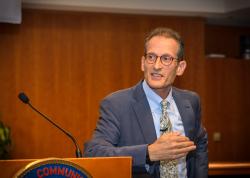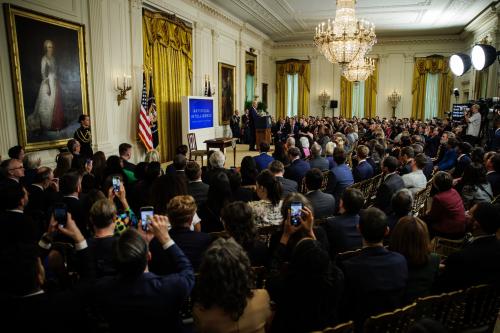A rally in Boston last month featured the sign: “Objective Reality Exists”. Then The New York Times advertised that the “truth is more important now than ever.” A Washington Post columnist started writing about a “Post-Enlightenment” world. A collection of high-tech firms, including Airbnb, Apple, Facebook, Google and Netflix, told the Ninth Circuit Court of Appeals that “[i]mmigrants are innovators.” The upcoming Earth Day 2017 plans to host tens of thousands of people marching for science. What’s going on?
It’s all the same thing. The reaffirmation of the most important idea in modern society: that any person, regardless of his or her individual characteristics, can seek and find the truth.
This is the Scientific Revolution, but part of its reawakening is the recognition that truth-finding forms the basis for technological innovation, for capitalism and for democratic rule. All rest on the single, and simple, concept that individuals matter and that the very ability of individuals to think for themselves creates scientific propositions to be tested, technological innovations to be imagined, market outcomes to be respected and democratic outcomes to be treated as legitimate – even outcomes that some voters may deeply regret.
This idea was hard fought. Think back to Galileo, who in 1609 used a telescope to observe the planets and concluded that the Copernican theory of the universe was true: planets revolved around the sun and the earth itself moved in orbit.
Few took him seriously. In fact, a number of scholars refused even to look through Galileo’s telescope to see the moons of Jupiter, insisting that nothing they saw would have any real meaning. This is very important. These scholars felt that if what they believed conflicted with what they observed with their own eyes, their beliefs would prevail.
Galileo took a different view. He believed that he could learn from what he saw, representing a fundamental shift. And the resulting trial of Galileo for heresy was a struggle between two ways of finding truth.
With the Scientific Revolution, truth was no longer the preserve of a political or religious hierarchy. One could argue that this movement sparked a chain reaction from the Scientific Revolution to our own American Revolution. The era encompassed Copernicus, Newton, and the great 17th Century Enlightenment philosophers from whose ideas in turn arose the great democratic movements of the 18th Century. 1776 was a key year, marked by both the Declaration of Independence and the publication of Adam Smith’s “The Wealth of Nations”. In many ways the political and economic achievements of 1776 were the legacies of the Scientific Revolution. The technological revolutions that followed—from railroads and telephones onward—were created by people who dared to dream.
The fundamental notion that individuals are free to think and speak and pray is science’s continuing gift to us. Indeed, reflecting on what drew him to the study of physics, Stephen Hawking once noted that in his chosen field, “It doesn’t matter what school you went to or to whom you are related. It matters what you do.”
Of course, the world (even petty scientific jealousies to one side) hasn’t always lived up to that lofty standard. When German scientists wanted to attack Einstein’s work on relativity, they labeled it “Jewish science”. The notion is ridiculous (and dangerous) because it judges science by “who” made a discovery rather than “what” was discovered. This is wrong: Ideas (discoveries, theorems, inventions, etc.) should be judged on their merits, not on the background or rank of their proponent.
When one of these principles of discovery is attacked, all are attacked. But when one stands strong, they all stand stronger. For example, rather than questioning the role of the press, former President George W. Bush said recently that the news media is “indispensable to democracy” because “[w]e need an independent media to hold people like me to account.”
Freedom of the press supports science, democracy, innovation and competition. They are all ways of finding truth through the actions of individuals. This does not mean that civil society is unimportant, religion less vital or families less central to human existence. It just means that society works best when it is respects the freedom to hypothesize; to invent; to start a business or choose not to buy from one; to vote.
If you read a newspaper, post an opinion on social media, look up at the stars and ponder the universe, use your smartphone, pause in the aisle of a supermarket to select a brand of milk for your family; then you are a present-day heir to this tradition. The March for Science on April 22 is not about partisan politics; it’s a time to stand on the shoulders of giants. And to remind ourselves to see what they foresaw.






Commentary
The common origins of science and democracy
March 8, 2017